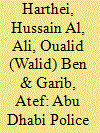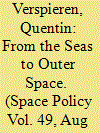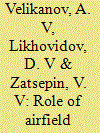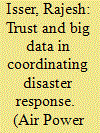| Srl | Item |
| 1 |
ID:
130884


|
|
|
|
|
| Publication |
2014.
|
| Summary/Abstract |
Emergency services such as police vehicles must provide reasonable service levels in order to ensure public safety. These services are typically provided by vehicles based at fixed locations. The number and placement of vehicles generally influences the quality of services offered. Increasing the number of vehicles is often limited by cost constraints; therefore the efficient deployment of such service vehicles is a crucial issue. Emergency service vehicles must be located in such a way that they may reach any demand point within a maximal response time. Current Practices in Abu Dhabi The traffic police in Abu Dhabi perform two major functions: enforcing traffic Abu Dhabi Police Plans laws and assisting road users. Within the Abu Dhabi Police department, the Directorate of Traffic and Patrols, which is in charge of all traffic aspects, allocates the traffic patrol vehicles to routine work and to special operations. The special operations vehicles are involved in escorting convoys and motorcades and in enforcing traffic laws and regulations through the deployment of patrol officers in specific areas at certain times, or in dealing with incidents and special events. The routine patrols perform all remaining tasks. At present, the patrol car allocation process is largely manual and relies heavily on the knowledge, experience and expertise of the dispatch operators. The operators divide the Emirate into geographic zones and allocate patrols based on their knowledge about the areas' needs and other criteria such as traffic flow patterns, population density, etc. In the event of an accident or call for assistance, the dispatcher calls on one of the patrol vehicles nearby and assigns it the task of dealing with the event.
|
|
|
|
|
|
|
|
|
|
|
|
|
|
|
|
| 2 |
ID:
169351


|
|
|
|
|
| Summary/Abstract |
Data collection and information sharing are at the core of any traffic control system. In particular, Maritime Situational Awareness—restricted in this article to one of its main components, the automatic identification system (AIS)—and Space Situational Awareness (SSA) are the backbones of, respectively, maritime and space traffic control frameworks. While the AIS has been initiated by civil authorities for civil purposes and is now being adopted by navies around the world, SSA, originally developed by the military to protect national security assets in outer space is progressively transferred to civil actors. This article shows how and why the intrinsically different nature and history of maritime and space traffics generated a totally reverse approach towards information and responsibility sharing in support to traffic control, while presenting current proposals for the evolution of SSA.
|
|
|
|
|
|
|
|
|
|
|
|
|
|
|
|
| 3 |
ID:
130664


|
|
|
|
|
| Publication |
2014.
|
| Summary/Abstract |
The article discusses the importance of the role of airfield ground support services in the combat readiness of aircraft operated by Air Force units. It also examines the structure and purpose of aviation complexes and the role of airfield towing services within the system of preparing equipment according to the specific operations of the aviation complex. It also presents recommendations for designs of towing vehicles to prepare the aviation complex against large-scale guided weapons attacks.
|
|
|
|
|
|
|
|
|
|
|
|
|
|
|
|
| 4 |
ID:
151350


|
|
|